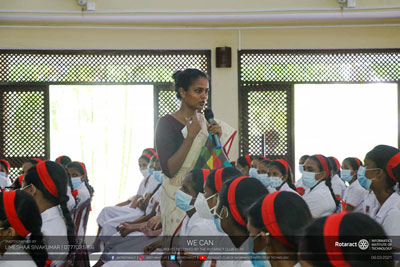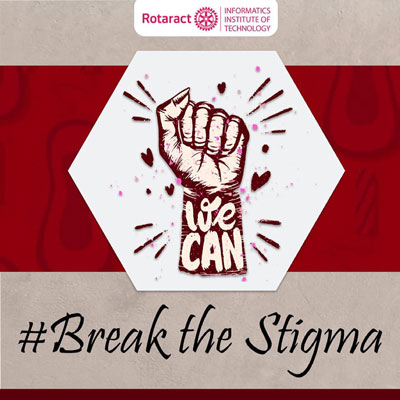‘WE CAN’ : A solution put forward by the Rotaract Club of IIT to clear all concerns that have been clouded by misjudgment regarding Menstruation
View(s): Menstruation. The one essential biological process experienced by almost every woman, that keeps mankind sustained.
Menstruation. The one essential biological process experienced by almost every woman, that keeps mankind sustained.
Menstruation is a common, shared experience by every woman and only women know what it is like to get her first period or the changes that her body must bear every once in 28 days. However, in many parts of the world, predominantly due to cultural discrepancies and detrimental concepts that have been taken into consideration, the concept of menstruation is highly stigmatized. Sri Lanka, being one such country with highly valued culture, which is to some extend perhaps may be a good thing, also fosters taboo surrounding the topic of female reproduction health. This has resulted in the lack of educational resources on female reproduction and menstruation for those who really need it, in many areas of the country.
 Therefore, the Rotaract Club of Informatics Institute of Technology (RACIIT), along with Happy bleeding, Let’s talk, Yeheliya Foundation, Momiji Natural and Youth Rise longed to bring a change and break the taboo surrounding this topic with the initiation of project ‘We Can’.
Therefore, the Rotaract Club of Informatics Institute of Technology (RACIIT), along with Happy bleeding, Let’s talk, Yeheliya Foundation, Momiji Natural and Youth Rise longed to bring a change and break the taboo surrounding this topic with the initiation of project ‘We Can’.
Project We can is centered upon numerous sustainable development goals such as Good health and wellbeing, Quality education, Gender equality, Decent work and economic growth and Responsible consumption and production. Additionally, it also aims in securing the Rotary focus areas of Disease prevention and treatment, and Basic education and literacy.
The first phase of the project was to create a sense of awareness amongst the general public by carrying out a social media campaign including thoughts from well-known public figures on social media simply just to gain a greater reach. The campaign comprises of three main goals to be achieved, which are to be accomplished in the basis of steps alongside the project plan. The steps to be implemented throughout the campaign are creating awareness based on the thoughts by women, as for the second step, a few thoughts by men to create equality, and finally bringing into the conscience of our audience regarding the ill-effects of period poverty and advocating taking further steps to eliminate this matter in Sri Lanka.
Apart from the social media campaign, the main idea behind this initiative is to reach out to women who are unaware of as to how to maintain their menstrual health and men who need to know the stigma surrounding their beliefs. As for phase 2, we visited a few schools along with Ms.Nadeesha Paulis, a writer, journalist, period cup advocator and founder of happy bleeding, who also thrives to accomplish the same goals in breaking the stigma around the topic of menstruation and educating young women.
Our journey of enriching young lives started off with Sacred heart convent, which took place on the 6th of April 2021. Following the educational session poured into these young minds, we allocated a little time for these young girls to clarify any doubts which surprisingly went even better than expected, with the session drowning in a flood of questions. The next call was to Gnanissara Maha Vidyalaya, Aluthgama, where like day 01, a few RACIITians along with Nadeesha paid a visit on the 21st of April 2021. The significant element that stood out from this visit was the fact that this school was a mixed school, giving us the privilege of enlightening both young girls and boys. The following day, we visited Badanagoda junior school where we also carried out the same procedure to upkeep our focus. Throughout all these visits, the whole concept of breaking the stigma was highly emphasised whilst also engaging the students in normalising the word ‘period’ and letting them know that being on your period or simply, being a woman does not signify your impurity or whatsoever society tends to utter.
With this we move on to our third phase which intends to combat against period poverty in Sri Lanka. Period poverty refers to the unavailability of education on menstruation and hygiene, as well as having little to no access to basic sanitation for essential hygiene amenities during the menstruation period. These factors frequently result in social stigmas that exclude women from basic activities, such as attending school or work and may even lead to physical health risks. Given that this initiative focuses on breaking the stigma surrounding the topic of menstruation, we donated, 25 young girls from low income families, reusable sanitary pads which could be re-used for over two to three years, to a viable community beseeching for aid due to financial instability.
Thus, rounding off this minor brief of yet another great initiative put into action by the RACIIT, they were able to reach out and enlighten many young girls and boys leaving aside the colour, social status or culture, hoping that one-day menstruation will not be a taboo but a naturally occurring, sanctified gift given to a woman.
Written by: Avisha De Mel



